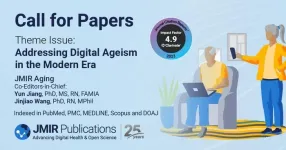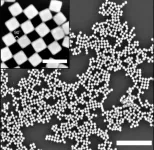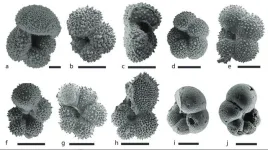(Press-News.org) (Toronto, June 13, 2024) JMIR Publications invites submissions to a new theme issue titled “Addressing Digital Ageism in the Modern Era” in its premier open access journal JMIR Aging, indexed in PubMed, SCOPUS, Web of Science, and DOAJ. The theme for this call was selected by the journal’s diverse audiences through a social media poll.
While digital technologies offer immense opportunities for societal progress and individual empowerment, they also bring forth new challenges, such as digital ageism. Digital ageism is discrimination against individuals based on their age within the context of use of and access to digital technology. As technology continues to permeate every aspect of our lives, it is important to address the barriers, stereotypes, and marginalization experienced by older adults in the digital realm and ensure inclusivity for people of all ages. Therefore, in this call, we aim to address digital ageism in care for older adults with a focus on access to digital health care and health equity.
Our interests include, but are not limited to, the following topics:
Technological design considerations for creating age-inclusive digital environments and products for older adult care
Leveraging technology to build age-friendly health systems
Innovative strategies to promote digital health inclusion, such as intergenerational collaboration and digital mentorship
Digital health literacy programs and initiatives to empower and engage older adults
Health policy interventions and regulatory frameworks to promote digital inclusion
Community-driven initiatives addressing digital ageism in health care
Ethical considerations in designing digital health care technologies for an aging population
All submissions will undergo a rigorous peer-review process, and accepted articles will be published as part of the theme issue titled “Addressing Digital Ageism in the Modern Era.”
Read the call for submissions to learn more
About JMIR Publications:
JMIR Publications, celebrating its 25th anniversary in 2024, is a leading open access digital health research publisher. As a pioneer in open access publishing, JMIR Publications is committed to driving innovation in scholarly communications, advancing digital health research, and promoting open science principles. Our portfolio features 35 open access, peer-reviewed journals dedicated to the dissemination of high-quality research in the field of digital health, including the Journal of Medical Internet Research, as well as cross-disciplinary journals such as JMIR Research Protocols and the new title JMIR XR & Spatial Computing.
END
JMIR Aging announces new theme issue on digital ageism
2024-06-13
ELSE PRESS RELEASES FROM THIS DATE:
Photonic chip integrates sensing and computing for ultrafast machine vision
2024-06-13
WASHINGTON — Researchers have demonstrated a new intelligent photonic sensing-computing chip that can process, transmit and reconstruct images of a scene within nanoseconds. This advance opens the door to extremely high-speed image processing that could benefit edge intelligence for machine vision applications such as autonomous driving, industrial inspection and robotic vision.
Edge computing, which performs intensive computing tasks like image processing and analysis on local devices, is evolving into edge intelligence by adding artificial intelligence (AI) driven analysis and decision-making.
“Capturing, processing and analyzing images ...
MD Anderson Research Highlights: EHA 2024 Special Edition
2024-06-13
ABSTRACTS: LB3439, LB3442, S131, S132, S136, S164, S222
MADRID – The University of Texas MD Anderson Cancer Center’s Research Highlights showcases the latest breakthroughs in cancer care, research, and prevention. These advances are made possible through seamless collaboration between MD Anderson’s world-leading clinicians and scientists, bringing discoveries from the lab to the clinic and back. This special edition features presentations by MD Anderson researchers at the 2024 European Hematology Association (EHA) Congress.
Triplet therapy significantly improves response rates ...
Australian solar panel recycling tech on show in Spain
2024-06-13
Australian researchers are developing solutions to recycle solar panels and recover strategic metals including silver and copper.
In Australia alone, it’s estimated more than 100,000 tonnes of solar panels will enter the waste stream by 2035, along with billions of dollars’ worth of materials that could be recaptured.
RMIT University is leading an international network of researchers working to advance the reuse and recycling of solar panels, which can contain valuable materials like lead and tin.
Thursday 13 June was the opening of a work and exhibition space at engineering company EDIPAE’s ...
Bhatia named new head of ITER projects at PPPL
2024-06-13
Ravinder Bhatia, a leader and engineer with three decades of experience managing collaborative science initiatives, is the new head of ITER projects at the U.S. Department of Energy’s Princeton Plasma Physics Laboratory (PPPL).
In this role, Bhatia oversees the design and fabrication of six diagnostic systems, or sensor systems, that PPPL is building for ITER, the multinational facility under assembly in France to study plasma that can heat itself and sustain its own fusion reactions. The diagnostics will observe the plasma within ITER to measure properties that include temperature, ...
The Davos Alzheimer’s Collaborative launches global effort to streamline diagnosis of Alzheimer’s disease and related dementias
2024-06-13
The Davos Alzheimer’s Collaborative (DAC), the global organization seeking to cure Alzheimer’s disease and dementia, today announced a new initiative in health systems in five countries to deploy blood biomarkers (BBMs) and confirmatory diagnostic testing to increase timely and accurate diagnosis of Alzheimer’s disease and related dementias (ADRD). Led by the DAC Healthcare System Preparedness (DAC-SP) team, the Accurate Diagnosis project is the first-ever global implementation research program to study the use of blood biomarkers as part of the ADRD diagnostic ...
Nanosized blocks spontaneously assemble in water to create tiny floating checkerboards
2024-06-13
Researchers have engineered nanosized cubes that spontaneously form a two-dimensional checkerboard pattern when dropped on the surface of water. The work, published in Nature Communications, presents a simple approach to create complex nanostructures through a technique called self-assembly.
“It’s a cool way to get materials to build themselves,” said study co-senior author Andrea Tao, a professor in the Aiiso Yufeng Li Family Department of Chemical and Nano Engineering at the University of California San Diego. “You ...
University of Colorado co-leads multicenter randomized trial identifying method of emergency intubation preoxygenation to decrease risk of hypoxemia and cardiac arrest
2024-06-13
In current clinical care, most critically ill adults undergoing emergency tracheal intubation receive preoxygenation through an oxygen mask. Administering supplemental oxygen to patients prior to the start of an intubation procedure increases the oxygen content in the patient’s lungs and decreases the risk of hypoxemia, low levels of oxygen in the blood. However, hypoxemia occurs during 10% to 20% of tracheal intubations in the emergency department or intensive care unit and may lead to cardiac arrest and death.
The University of Colorado co-led a trial with Vanderbilt University that compared the two most ...
Quantum data assimilation: A quantum leap in weather prediction
2024-06-13
Data assimilation is a mathematical discipline that integrates observed data and numerical models to improve the interpretation and prediction of dynamical systems. It is a crucial component of earth sciences, particularly in numerical weather prediction (NWP). Data assimilation techniques have been widely investigated in NWP in the last two decades to refine the initial conditions of weather models by combining model forecasts and observational data. Most NWP centers around the world employ variational and ensemble-variational data assimilation methods, which iteratively reduce cost functions via gradient-based optimization. However, these methods require significant computational resources.
Recently, ...
Ancient ocean slowdown warns of future climate chaos
2024-06-13
When it comes to the ocean’s response to global warming, we’re not in entirely uncharted waters. A UC Riverside study shows that episodes of extreme heat in Earth’s past caused the exchange of waters from the surface to the deep ocean to decline.
This system has been described as the "global conveyer belt," because it redistributes heat around the globe through the movement of the ocean waters, making large portions of the planet habitable.
Using tiny, fossilized shells recovered from ancient deep-sea sediments, the study in the Proceedings of the National Academy of Sciences demonstrates how the conveyor belt responded around 50 ...
Pre-operative use of GLP-1s may reduce complications after metabolic and bariatric surgery in patients with extreme obesity
2024-06-13
SAN DIEGO – June 13, 2024 – A combination of GLP-1 agonists taken before metabolic and bariatric surgery may help patients with extreme obesity lower the risk of post-operative complications, according to a new study* presented today at the American Society for Metabolic and Bariatric Surgery (ASMBS) 2024 Annual Scientific Meeting
Patients with extreme obesity, a body mass index (BMI) of 70 or more, face a higher risk of complications from surgery compared to patients with lower BMIs. Studies have shown weight loss before surgery can mitigate risk but lifestyle intervention ...








